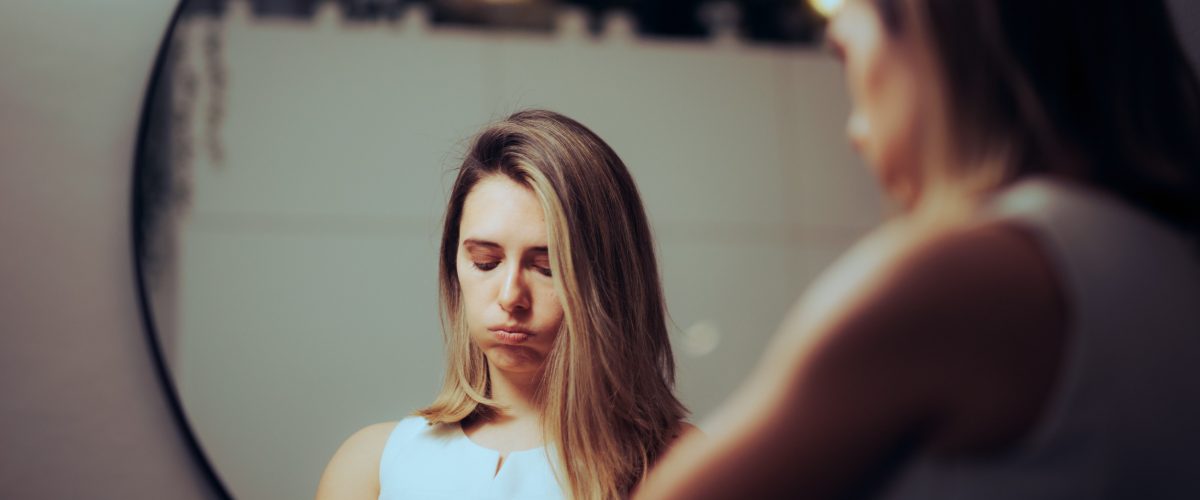In the age of social media, we constantly are bombarded with heavily curated and often-edited content that displays images advertising the ideal. Ideal bodies, clothing, families, homes. You name it, and there is a social media page for it. For many social media users, these images are nothing like our daily realities.
And yet we love to see them.
Upward social comparison describes the psychological experience of comparing yourself to a person or a demographic of people whom you perceive to have a higher social status than you. Likewise, downward social comparison happens when you compare yourself to a person or group whom you perceive to have a lower social status. Humans do this almost constantly.

Mallory Challis
I remember learning about social comparison in an undergraduate course called “Social Psychology,” which I took because it fulfilled a requirement for my psychology minor. The phenomenon, my professor explained, has to do with self-esteem. To feel secure in our lives, we constantly seek validation from the world around us.
And engaging in these social comparisons produces some positive outcomes.
Upward, downward
For example, a wealthy person who makes downward social comparisons to homeless people might develop feelings of gratitude for what they have, and empathy for what others don’t. These feelings may encourage the wealthy person to volunteer at a relief organization or donate to a charity.
On the other hand, a person who struggles with home cleaning might make an upward social comparison to friends who showcase their organized homes at dinner parties and other social gatherings. Seeing this may encourage the person struggling to keep their home clean to seek out advice on ways to begin organizing their own space.
Despite positive impacts of social comparisons, they also can cause problems, especially for people making upward social comparisons.
However, despite positive impacts of social comparisons, they also can cause problems, especially for people making upward social comparisons.
For example, instead of feeling encouraged to get organized, the person struggling to clean their home might enter a friend’s home and feel discouraged because they cannot seem to keep their own home clean. This may be harmful to their self-esteem, since the comparison makes them feel as though they failed or are incapable of a task they wish to accomplish.
Comparing on social media
Social media, especially photo-sharing sites like Instagram, are popular because they appeal to our desire to make these social comparisons. We like to see what is happening in the world around us and use what we see others doing to measure our own successes, achievements and abilities. This is important for the development of self-esteem, because it helps us set realistic goals and offers a basis for critiquing or praising our own behavior.
However, constant exposure to hyper-idealistic, and often unrealistic, expectations produces harmful effects.
Increase in body dissatisfaction has been caused by consistent upward comparison-making with social media influencers …
In a 2022 study published by the International Journal of Environmental Research and Public Health, researchers Federica Pedalino and Anne-Lina Camerini showed Instagram use is correlated with lowered levels of body appreciation among young women. The increase in body dissatisfaction has been caused by consistent upward comparison-making with social media influencers and with their peers online, the researchers reported.
On a peer level, they learned women using Instagram are likely to upwardly compare themselves to friends, classmates and others they know in real life by paying attention to those who are most good-looking or elicit the most positive attention on social media, such as likes, comments, shared posts, etc. In turn, women tend to try imitating these peers to increase their own self-esteem by receiving similar public responses validating their beauty or social value.
On a public level, the researchers also demonstrated social media influencers — users who are very popular online, but do not necessarily know all their followers or “friends” personally — are huge sources of upward social comparison for women online.
Mirage of perfection
Many social media influencers get paid to produce heavily curated and edited content on their pages, so it does not reflect a typical life. The body images, lifestyles and other qualities portrayed on these accounts are unattainable on a regular basis. Followers are only seeing the best shot, with the best lighting and the best editing. Hundreds more photos that were not influencer-worthy probably still are sitting in the camera.
This constant exposure to influencers’ perfect-seeming lives can be harmful to self-esteem over time, making us feel as though our lives can and should look like that. It causes us to second-guess our own self-worth when our lives inevitably fall short of these impossible standards. After all, these images tagged with #lifegoals are not even real.
I admit I have stood in front of my bathroom mirror countless times trying to recreate hairstyles, makeup looks and outfit ideas I’ve seen online, only to get frustrated because I never look quite like the Instagram posts on my feed. “Well, this is what I’m working with,” I eventually tell myself as my hair flops over, my winged eyeliner is uneven and my jeans don’t fit my body like they fit the influencer’s.
But I just look normal.
The imperfections I see in myself are similar to the ones I barely notice in women I see in real life.
My hair, face and body don’t get airbrushed with filters and other editing software that makes me look perfect. The imperfections I see in myself are similar to the ones I barely notice in women I see in real life.
And it’s likely the look I’m trying to replicate only lasted a few moments on the influencer as the photo was taken, or perhaps only ever existed behind the editing screen before the influencer herself looked in the mirror at a real-life person. Yes, these people also probably tell themselves from time to time, “This is what I’m working with, and that’s just fine.”
Just like everybody else, these influencers are limited to the realistic experiences of embodied life. Although they may be able to make their lives seem perfect and idealistic, when it comes down to it, no one’s life is really like that. Everybody has something about their body they dislike, a part of their home that never looks up to shape or a personal burden that makes life seem not-so-glamorous.
And you know what? These things are a result of participating in the full, embodied life we are called to live.
So, say a prayer of gratitude for your body and all the things you love and hate about it. It is made in the image of God and works hard each day to be the vessel in which you experience life. Write a benediction about your home and all its messes. It is the place in which you and your family and friends are crafting memories. The next time you see an idealistic Instagram post, thank God for your imperfections. They are what make you, you.
And with the heart of a Southern Christian woman, I think it’s a good practice to ask God to “bless this mess.” Because God loves us, mess and all, and never expects our life to look like a perfectly curated Instagram feed.
Mallory Challis is a master of divinity student at Wake Forest University School of Divinity. She is a graduate of Wingate University and is a former BNG Clemons Fellow.
Related articles:
AI ‘deep fakes’ are creating a new way of violating women’s privacy on the internet
When social media photos transport me
‘Social media posts never change minds’ — and other lies I love to hate
Social media behavior a reflection of faith, theologian says


